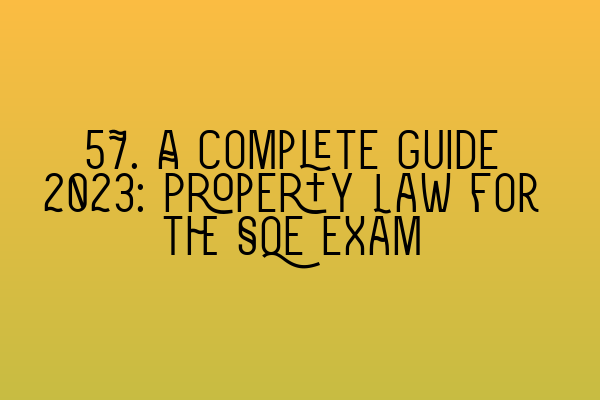57. A Complete Guide 2023: Property Law for the SQE Exam
Greetings, aspiring solicitors! If you’re preparing for the SQE exam, it’s essential to have a solid understanding of Property Law and Land Law. This comprehensive guide aims to help you navigate this complex topic effectively and ace your exam with confidence.
Basics of Property Law
Property Law governs the legal rights and obligations associated with real estate, including land, buildings, and any improvements made on them. It encompasses both residential and commercial properties, as well as the various legal relationships that arise in property transactions.
Understanding Property Law is crucial for aspiring solicitors, as it forms a substantial portion of the SQE exam. An in-depth knowledge of this subject will enable you to advise clients on property-related matters, including buying, selling, and leasing properties, and dealing with disputes.
Key Concepts in Property Law
Before delving into specific topics, let’s first familiarize ourselves with some fundamental concepts in Property Law:
- Real Property: Refers to land and anything permanently attached to it, such as buildings or trees.
- Personal Property: Refers to movable possessions, including vehicles, jewelry, and furniture.
- Freehold and Leasehold: Freehold estates grant the owner exclusive rights to the property indefinitely, while leasehold estates provide the owner with rights for a specific period.
- Easements: These are legal rights to use another person’s property for specific purposes, such as accessing a neighboring property.
- Covenants: These are legally binding agreements or promises between parties regarding the use or treatment of a property.
- Adverse Possession: This principle allows an individual to claim ownership of land by occupying it continuously and without the owner’s consent for a specified period.
Now that we have a basic understanding of Property Law, let’s explore some essential topics that frequently appear in the SQE exam.
Important Topics in Property Law for the SQE Exam
1. Co-ownership and Trusts
Co-ownership refers to the joint ownership of a property by two or more individuals. This topic involves understanding different forms of co-ownership, such as joint tenancy and tenancy in common, as well as the legal rights and obligations of co-owners. Trusts, on the other hand, involve the legal arrangement where one party holds property for the benefit of another. An understanding of trust principles and how they intersect with co-ownership is essential for the SQE exam.
2. Leases and Tenancies
Leases and tenancies form a vital aspect of Property Law. You should be well-versed in the classification of tenancies, the creation and termination of leases, and the rights and responsibilities of both landlords and tenants. This includes understanding the legal requirements for tenancy agreements and the processes involved in eviction.
3. Land Registration
Land Registration plays a significant role in Property Law, ensuring transparency and maintaining accurate records of property ownership. You should have a solid understanding of the land registration process, including the concept of adverse possession and remedies for registration-related disputes.
4. Mortgages
Mortgages are essential in property transactions, and a thorough understanding of this topic is crucial for solicitors. You should comprehend the legal principles governing mortgages, the rights and responsibilities of lenders and borrowers, and the various types of mortgages available.
5. Dispute Resolution
Disputes are an inevitable part of property transactions. Familiarize yourself with the dispute resolution mechanisms, such as negotiation, mediation, arbitration, and litigation. Understanding the principles and procedures involved in resolving property disputes will be beneficial for both the SQE exam and your future practice as a solicitor.
Preparing for the SQE Exam: A Roadmap
Now that you have an overview of the essential topics in Property Law for the SQE exam, it’s time to devise a strategy for efficient exam preparation. Here are a few tips:
- Review the SQE Exam Blueprint: Familiarize yourself with the official SQE exam blueprint, which outlines the topics and skills assessed in each exam.
- Invest in Quality Study Materials: Seek out high-quality study materials, textbooks, and practice questions related to Property Law. SQE 1 Practice Exam Questions and SQE 1 Practice Mocks FLK1 FLK2.
- Enroll in Preparation Courses: Consider enrolling in comprehensive SQE 2 Preparation Courses and SQE 1 Preparation Courses that focus on Property Law and Land Law, offering expert guidance and study resources.
- Practice, Practice, Practice: Regularly practice SQE-style questions and mock exams to enhance your understanding and improve time management skills.
- Stay Updated: Keep yourself updated with recent developments and changes in Property Law by referring to authoritative legal publications and websites.
Conclusion
Congratulations! You’ve taken the first step towards mastering Property Law for the SQE exam. By understanding the key concepts, exploring important topics, and following a well-structured study plan, you’ll be well-prepared to tackle Property Law questions confidently. Remember to refer to the SRA SQE Exam Dates to stay informed about crucial exam deadlines.
Good luck with your SQE exam preparation, and may your journey towards becoming a qualified solicitor be successful!
